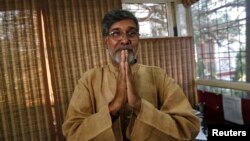Indian child rights campaigner Kailash Satyarthi, who won the Nobel Peace Prize along with Malala Yousafzai of Pakistan, has pledged to continue his three-decade long campaign to end child labor. The 60-year-old-Indian activist also wants to join hands with the Pakistani teenager to work for peace in the two countries. The award was announced at a time when the rivals have been engaged in intense border clashes.
Soon after the prestigious award was announced, child rights activist, Kailash Satyarthi, dedicated it to the hundreds of millions of children who he said are deprived of their childhood, freedom and education. He said the fight to free child laborers and give them education has to continue.
It was a proud moment for the campaigner who has helped free thousands of children working in a host of industries such as carpet factories and stone quarries.
It was in the early 1990’s that the electrical engineer first got noticed as he led countless street marches in the heart of the Indian capital to pressure the government to enforce laws that forbid employment of children under 14.
The simple, kurta-clad activist built up his movement slowly. He led raids in carpet factories where children, sometimes as young as eight, were forced to work for long hours. He helped create international consumer resistance to products made by child labor and founded RugMark, an international scheme that tags carpets made in factories that do not employ children.
For some years, Satyarthi worked with another child rights campaigner, Swami Agnivesh, before starting his Save Childhood Movement (Bachpan Bachao Andolan).
Agnivesh points to the gravity of the problem of child labor in India.
“They are brought by these unscruplous labor contractors and then they force them to work for 14 -16 hours a day. They are put in some sort of lock, locked in from outside, and it is a very serious story of exploitation of children," said Agnivesh.
Satyarthi says his social conscience was awakened early when he saw poor children at work in his home town in Madhya Pradesh state. He says poverty should not be used as an excuse to keep children at work instead of in the classroom, and blames child labor on the fact that employers benefit by getting work done for a pittance.
The Indian activist says that sharing the award with Pakistani child activist Malala Yousafzai is a big statement from the Nobel Committee. He told reporters he would invite Malala to work for peace in the subcontinent besides education and girls rights.
“It is important that the children in my country and in Pakistan and globally are born in peace and they can live and grow in peace. That is very important," said Satyarthi.
The Nobel Peace Prize for activists from the two countries has been announced when they have been trading fire along their border for nearly a week.
Agnivesh called it a “symbolic” message to the two countries.
“It is a recogniton of the issue and the problem and also a challenge to the powers that be that don’t waste your rescources on military. Better put them on education. India has failed to fulfil its promise. Since 1980’s and 90’s they have been saying we will spend six per cent of our GDP on education, but hardly half of that is being put for education. Military expenditure is rising every year, " said Agnivesh.
Satyarthi says the scale of the problem is still huge - he estimates that about 60 million children in India still toil away in industries, or in farms instead of attending classes. Child rights campaigners hope the Nobel Peace Prize will will mark a turning point in his three-decade old campaign to end child labor in South Asia.




